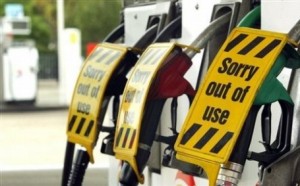Peter Newman, Professor of Sustainability at the Curtin University Sustainability Policy Institute, and well known for the key role he played in reviving the passenger rail system in Perth, Western Australia, has recently published a co-authored paper (‘Peak Car Use,’ Understanding the Demise of Automobile Dependence) showing that peak car use per capita in Australia occurred seven years ago, in 2004. Car use has been in decline ever since.
Professor Newman spoke to the paper, written with fellow transport researcher, Jeff Kenworthy, on 7 May on The Science Show on ABC Radio National. He observed that teenage car use, in particular, is in decline and stressed the major efficiency advantage of rail transport in an urban setting such as Melbourne. Both roads and railways cost about the same to construct but rail services have the capacity for 8 to 20 times as many passengers.
The paper discusses six major factors contributing to the decline in car travel:
- Hitting the Marchetti Wall (the idea that people do not like to spend more than one hour each day travelling to work)
- Growth in public transport
- Reversal of urban growth
- Ageing of cities
- Growth of a culture of urbanism
- The rise in fuel prices
What is the major message here for the residents of Banyule?
One is that if the Doncaster rail service is built and operated with good connecting bus links, such as now exist in Perth’s public transport system, it will make a significant and positive difference for work and other travel for residents of Banyule, Manningham and Boroondara.
More generally, it means that the Victorian government has to get a move on with improving capacity and performance in key parts of the transport network in Banyule and other municipalities.
We missed out on any additional services on the Hurstbridge line when the new train timetable was introduced on 8th May. There is not any money in the 2011-12 State budget to improve connecting bus services.
Urban expansion on the northern and western fringe of Melbourne with State government sanctioned but unprovided for population growth, continues notwithstanding the potentially dire consequences for the middle suburbs of Banyule.
Professor Newman has pointed the way to the future by letting us know what is already happening. Government needs to catch up. However, unless necessary public transport and associated land use and active transport initiatives are delivered, the congestion on Rosanna Road and other major arterial roads will get worse, notwithstanding the overall decline in car use.
You can read and hear what Professor Newman had to say on the ABC Radio National website at
http://www.abc.net.au/rn/scienceshow/stories/2011/3206293.htm
Peter Newman and Jeff Kenworthy’s paper, ‘Peak Car Use,’ Understanding the Demise of Automobile Dependence)is in World Transport Policy and Practice, Volume 17.2, June 2011
at http://www.ecoplan.org/wtpp/wtj_index.htm
Related articles
- Peak oil and peak cars (42bikes.warnock.me.uk)
- Are There Limits to Peak Oil and Climate Change as Motivators for Change? (treehugger.com)




